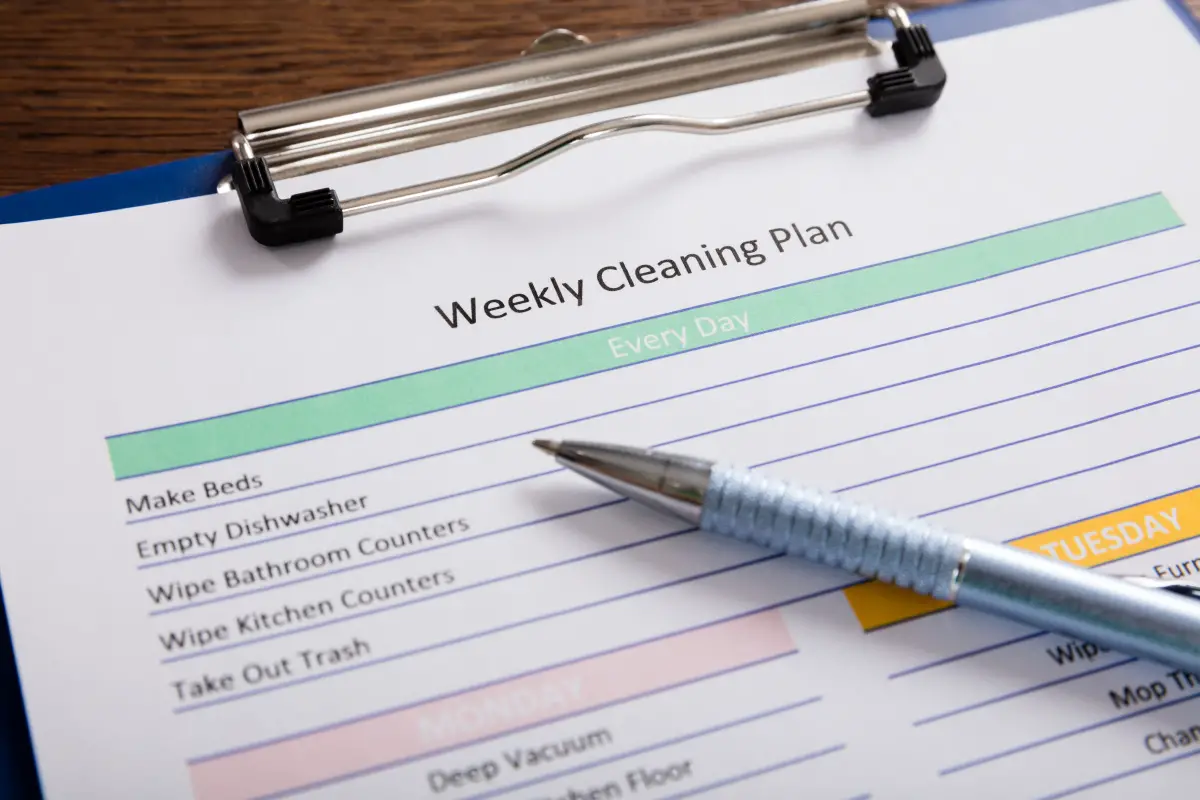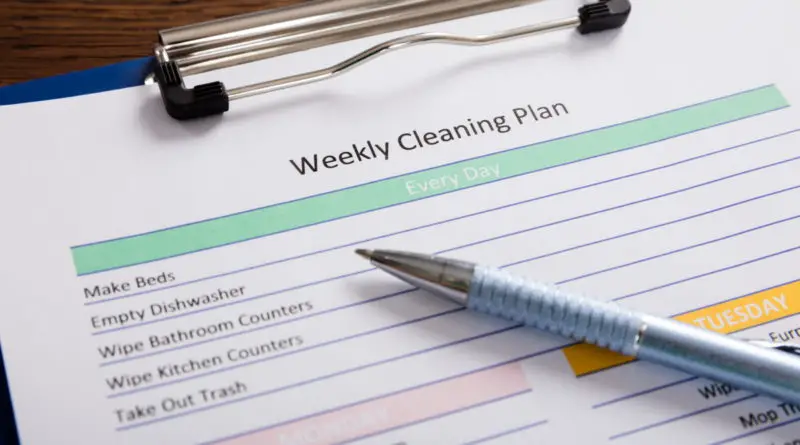How to Create an Effective Cleaning Schedule

Creating an effective cleaning schedule is not difficult.
In fact, the difficulty arises when you don’t have a schedule, as you can easily veer off-track and not accomplish what you set out to do.
Simply put, an effective cleaning schedule consists of the following:
- Making a list of all the chores that need to be done.
- Breaking the tasks down in terms of frequency, such as daily, weekly, monthly, etc.
- Setting a certain amount of time for each task.
- Assigning tasks to others (unless you live alone).
- Sticking to your schedule.
There’s no question that when it comes to cleaning, some people don’t enjoy it, some do, and others fall somewhere in the middle. I, for instance, have mixed emotions. There are some tasks that I find relaxing, such as ironing and cleaning the bathroom. Other jobs like cleaning baseboards or mopping the floor, I tend to need a little motivation to get the job done.
That’s one of the reasons for creating an effective cleaning schedule.
It helps you to stay on track.
It helps to keep you focused on the tasks that need to be done, rather than just doing the ones you like. And skipping the rest.
After all, if you desire a clean home, it all needs to get done.
What do I mean by creating an effective cleaning schedule? I mean one that works best for you because every home (and person) is different. You can certainly go online and look at what other people are doing for help and hints, but in the end, you need to tailor your schedule to your own needs.
Why Create a Cleaning Schedule?
Cleaning can be overwhelming, regardless of the size of your home.
And, a cleaning schedule is your game plan to stay on top of your household chores.
Here are some other reasons for creating a cleaning schedule:
- When you make and follow a cleaning schedule, your house will remain clean and tidy most of the time. This will help relieve stress levels, and you will feel more relaxed knowing you have completed your daily checklist.
- A cleaning schedule can help with accountability. Life is busy. And, knowing what needs to be done in the home, by whom, and by when, helps you and your family members keep your word and do your part.
- You won’t be doing any more of that frantic cleaning when you hear your mother-in-law is coming to visit in an hour. Sure, you might still have a little tidying up to do, but nothing compared to what you used to do.
- Perhaps the biggest reason is that having a cleaning schedule makes cleaning more efficient. When cleaning is efficient, it frees up your time to do other things you enjoy, such as spending time with your family, reading, or taking that well-deserved nap.
The Basics
Before we get into creating the actual cleaning schedule, there are few basic things to do first:
Make a list
Write down all the areas and things that need cleaning. I am talking about everything you can think of, not just the everyday tasks like dishes and laundry. Make sure you include all the things you clean once a month and once or twice a year, such as cleaning your windows and dryer vents.
Break the list down
Once you have your list, you need to organize it into what needs cleaning daily, weekly, monthly, etc. It helps to give a level of priority to each job. And, to help you figure out how much time to spend on each task. Then set a certain amount of time for each task.
Check Your Cleaning Supplies
Now that you can see all the different jobs that need to be done, you can make sure you have all the right cleaning tools and products (cleaning cloths, brushes, etc.). There is nothing more irritating than getting into a job and finding out you don’t have what you need to finish it.
Create Your Cleaning Schedule
Ok, now you’re ready to create your very own cleaning schedule.
You know what you need to do, you have all the equipment you need, and you’ve identified how much time each task will take.
All you need to do is determine how you want to break down the chores.
- Make a checklist either on paper or use a program like Excel with all the chores broken down; remember to make room for a tick box that you can check off, when you’ve completed a task.
- You don’t have to do everything yourself so, be sure to assign some tasks to others (spouse/children).
- Assign specific tasks to certain days of the week.
- Determine if a particular job needs to be done more frequently (more pets more vacuuming).
- Once created, do your best to stick to the schedule; otherwise, there is no point in creating one. Just keep checking off your checklist as you successfully complete a chore. Follow your plan, and it will work. Trust me!
Cleaning Schedule Tips
- Some busy households wait until the weekend to get it all done. In my experience, this is too much. The beauty of a cleaning schedule is that it enables you to spread things out over the week. Hence, less to do on the weekends.
- When you go shopping, you bring your shopping list with you. It makes shopping much easier. Well, guess what? It works the same for cleaning. Have your list of chores in front of you. It helps you prepare mentally and gives you an exact schedule of what you need to do. If you stick to your checklist, your cleaning will go more smoothly.
- Get assistance if you have little helpers. Kids love games, so give them a small and fun task, to start with. This could be putting their toys in designated boxes that you labeled first, either with a photo or words. Explain what it means. Some parents like to reward their kids for a job well done. I think that this is a brilliant idea to motivate your kids to help.
Let’s Recap
At the end of the day, the best cleaning schedule will be the one that works for your space and your lifestyle.
To recap, creating an effective cleaning schedule, includes the following components:
- Creating a list of all the chores that need to be done.
- Splitting the tasks down in terms of frequency, such as daily, weekly, monthly, etc.
- Assigning a certain amount of time for each task.
- Delegating tasks to others (unless you’re solo).
- Sticking to your schedule.
A cleaning schedule gives you a clear plan of what to do and when. This reduces stress around some of the overwhelm that can be experienced when you’ve left something unattended for too long. Laundry anyone?
So, minimize your stress and develop an individualized schedule to help you keep and maintain a tidy home.
